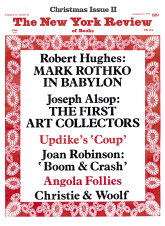When it’s Christmas we’re all of us magi.
At the grocers’ all slipping and pushing.
Where a tin of halva, coffee-flavored,
is the cause of a human assault-wave
by a crowd heavy-laden with parcels:
each one his own king, his own camel.
Nylon bags, carrier bags, cones of paper,
caps and neckties all twisted up sideways.
Reek of vodka and resin and cod
orange mandarins, cinnamon, apples.
Floods of faces, no sign of a pathway
toward Bethlehem, shut off by snow.
And the bearers of gifts, unassuming,
leap on buses and jam all the doorways,
disappear into courtyards that gape,
though they know that there’s nothing inside there:
not a beast, not a crib, nor yet Her,
round whose head gleams a nimbus of gold.
Emptiness. But the mere thought of that
brings forth lights as if out of nowhere.
Had Herod but known the stronger he seemed,
the more sure, the more certain the wonder.
Every year this constant relation
is the basic machinery of Christmas.
This they celebrate now everywhere,
for its coming push tables together.
No demand for a star yet awhile,
but a sort of goodwill touched with grace
can be seen in all men from afar,
and the shepherds have kindled their fires.
Snow is falling: not smoking but sounding
chimney pots on the roof, every face like a stain.
Herod drinks. Every wife hides her child.
He who comes is a mystery to no one:
but the signs are confusing, men’s hearts may
find it hard to acknowledge the stranger.
But the draft through the doorway will part
the thick mist of the hours of darkness
and a shape in a shawl stand revealed,
and the Christ-child and Spirit that’s Holy
will be sensed in the soul without shame;
a glance skyward will show it—the star.
This Issue
December 21, 1978



